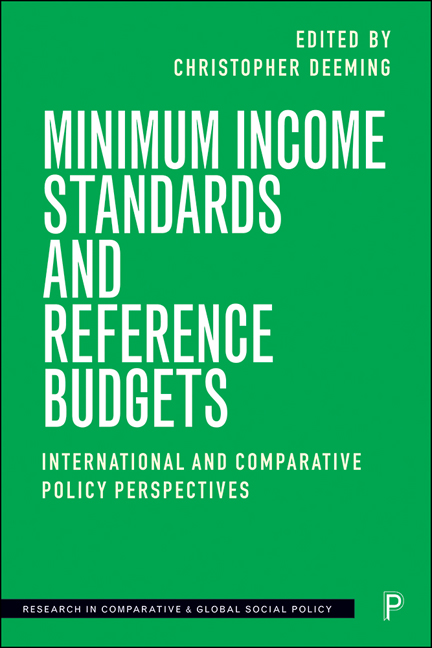10 - The Development, Value and Application of Budget Standards: Reflecting on The Australian Experience
Published online by Cambridge University Press: 12 March 2021
Summary
Introduction
‘Budget standards’ – or ‘reference budgets’ as they are now referred to in the EU context – have a long but chequered history. After more than a century since Rowntree first developed a household budget by identifying and costing the items needed to sustain a specified standard of living, researchers are still debating how this can best be done, doubts remain about the robustness of the estimates produced and policy makers remain unconvinced about the merits of the approach. These controversies have not affected the enduring appeal of the budget standards approach, which mirrors how households develop their own budgets. It also provides a systematic framework that can be varied to reflect methodological developments, alternative assumptions, new data, variations in broader social judgements and social norms that reflect behaviour and experience. This all sounds fine in theory, but in practice budget standards research has become bogged down in the minutiae of how to identify and cost specific items as well as an arena for well-rehearsed debates over the meaning and measurement of adequacy.
This chapter reflects on some of the reasons underlying these controversies, drawing on the author's experience with over 20 years of working in the field in the Australian context, and his engagement with broader international applications. The aim is to draw out some lessons for how to take forward the very important work begun by those involved in developing a common methodology for developing EU reference budgets (Storms et al, 2014; Goedemé et al, 2015a; see Chapter 18). That research involved a state-of-the-art review of the methodology of budget construction and has attracted great attention because the EU is committed to using the estimates in its ongoing monitoring of the adequacy of income safety nets in EU member countries. However, despite significant progress, there is still a substantial gap between where the research has taken us and where decision makers would like us to be. The following discussion, although by no means comprehensive, considers some of the obstacles that will need to be overcome before this gap can be narrowed. The analysis draws on the Australian experience but hopefully raises issues that are of broader interest and relevance.
- Type
- Chapter
- Information
- Minimum Income Standards and Reference BudgetsInternational and Comparative Policy Perspectives, pp. 139 - 154Publisher: Bristol University PressPrint publication year: 2020



